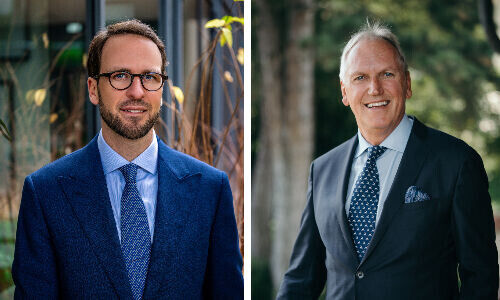Doha, Not Washington, a Unique Opportunity for Swiss Companies
Rising energy prices, geopolitical uncertainty, and mounting trade barriers are putting pressure on Switzerland’s economy. The Gulf States, by contrast, are growing rapidly and actively seeking reliable partners. This is a prime opportunity for Swiss companies, argue Jeremias Kettner and Thomas Borer in their contribution to finews.first.
In this section, authors comment on economic and financial topics.
The trade dispute with the United States underscores the vulnerability of Swiss exports. Companies exposed to Washington’s political agenda face growing uncertainty and dependence. To safeguard economic stability, Switzerland must pursue alternative partnerships grounded in strategic reliability and shared interests.
Gulf States Positioning Themselves as Global Economic Hubs
In today’s Europe of «polycrises,» SMEs are searching for stability and growth markets. At the same time, the Gulf States are positioning themselves as global economic hubs. Neutral Switzerland is uniquely placed to serve as a bridge between the two worlds.
«Swiss firms can leverage their reputation as neutral, discreet partners.»
Qatar calls itself the «Switzerland of the Middle East» – economically strong, politically neutral. This self-image offers Swiss companies strategic access built on trust, reliability, quality, and excellence. Gulf economies are actively seeking European technology partners to help diversify away from oil and gas into knowledge-based industries.
Swiss firms can leverage their reputation as neutral, discreet partners. Whether in education, healthcare, cleantech, or luxury goods, such partnerships require trust – something Switzerland can credibly deliver.
Focus is Shifting From Pure Returns to Strategic Partnerships
Gulf money meets Swiss precision: with Qatar managing over $450 billion and Saudi Arabia’s Public Investment Fund close to $900 billion, the focus is shifting from pure returns to strategic partnerships, technology, know-how and industrial excellence. Swiss SMEs have a competitive edge in precisely these areas, from clean-room technology to circular-economy solutions and high-precision manufacturing.
«To stand out, foreign players must increasingly contribute on the financing side as well.»
A key model is the «NewCo» approach – new entities established in Gulf free-trade zones that combine Swiss technology with Gulf capital. The growth potential is substantial: according to the World Bank, the GCC region is projected to expand by 3.2 percent in 2025, 4.5 percent in 2026 and 4.8 percent in 2027 with Qatar leading the pack at a forecasted 7.6 percent in 2027. Strategically located between Asia and Africa, the Gulf States have direct access to additional growth markets.
Chances For Swiss Family Offices
That said, the Gulf is a tough buyer’s market. Competition is intense, and Europe is just one power center among many. To stand out, foreign players must increasingly contribute on the financing side as well. Long-established Swiss family offices, investment banks, and private equity funds can play an important role here.
For companies new to the GCC market, engaging an experienced advisor or sparring partner is strongly recommended to ensure an efficient market entry and sustainable growth. The region operates by its own rules, from decision-making processes and political systems to cultural business norms. Understanding and strategically addressing these factors can save time, reduce risk, and significantly improve success rates.
Potential areas of engagement abound: joint ventures in renewable energy, recycling, healthcare, or artificial intelligence (for example, ETH AI Center).
Time For Bridge-Building
Emerging Gulf markets: a response to Europe’s growth dilemma? While Europe grapples with bureaucracy, aging demographics, and energy challenges, Qatar and Saudi Arabia offer substantial tax advantages, electricity costs as low as one-third of European levels, and logistics hubs such as Doha and NEOM.
«Switzerland and the Gulf States share values such as reliability, quality, and neutrality—assets that matter in an uncertain world.»
Moreover, the Gulf States possess considerable expertise across the entire energy value chain—from exploration and production to petrochemicals and emerging areas such as hydrogen, smart grids, and sustainable infrastructure. Swiss hidden champions can position themselves as equal partners in this transformation through local manufacturing, innovation hubs, and structured knowledge exchange.
Bottom line: The time for bridge-building is now. Switzerland and the Gulf States share values such as reliability, quality, and neutrality—assets that matter in an uncertain world. For Swiss companies and investors, this is the moment to build those bridges not merely as exporters, but as strategic partners in economic transformation. The opportunities are real. The only question is whether they will be seized.
Jeremias Kettner is a European expert on the Gulf region, founder of the advisory firm East West Bridges and Executive Chairman of the East West Bridges Investment Fund.
Thomas Borer is a former Swiss ambassador, founder and chairman of the advisory firm Dr. Borer & Partner AG.






















